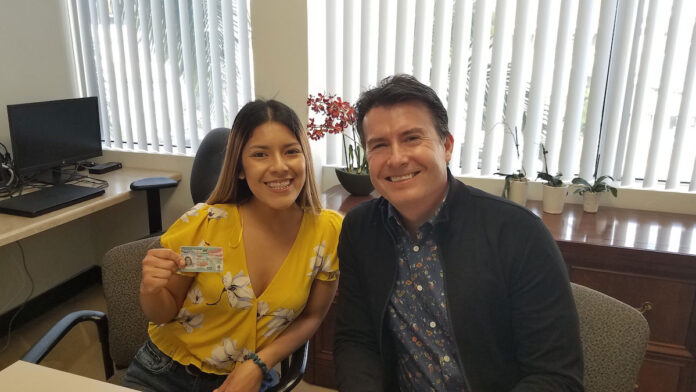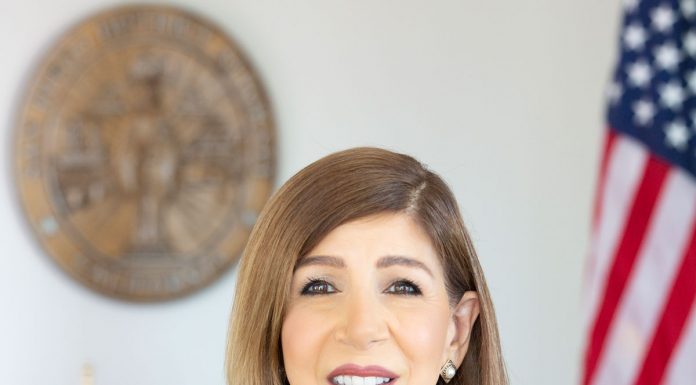Providing quality pro bono legal services to victims of human and civil rights violations, Casa Cornelia Law Center priced free legal services to some of the most vulnerable people in San Diego County qualified by law since 1993.
Associated with the organization for more than 25 years, Casa Cornelia Law Center Executive Director Carmen Chavez, an attorney by trade, became executive director in 2007, with her beginnings in the organization as a volunteer. A San Diego native and a resident in San Ysidro, Chavez said she considers herself “extremely privileged” in serving San Diego communities.
Chavez said though the geographic scope of Casa Cornelia is countywide, much of its work historically covers the border region in South Bay, and East County.
“We have provided, children, women, and men who are seeking assistance either through asylum, our children’s program, or our victims of crime program, so we have three core programs. In 2020, we responded to 1,320 individuals who sought our assistance,” said Chavez.
Chavez said people looking for asylum are people who fled their country because of persecution or torture, or the fear that it will happen to them and are being persecuted for who they are or what they believe in. She said it also represents vulnerable children who may have suffered abuse, abandonment, or neglect, and who are potentially eligible for a special visa for children.
“Lastly in our communities, we have assisted victims of serious crime who are working with law enforcement in the prosecution or investigation of certain crimes such as domestic violence, human trafficking, kidnapping, and more,” she said. “These are persons that we deemed to be the most vulnerable, so we look towards, friends, collaborators, partners, people in the community, and agencies that can come together with us to ensure that we are able to provide a full cycle of services to clients we are helping. And that includes volunteers.”
Chavez said to reach people in need, and the various languages that it must deal with, its diversity, so far it has represented people from almost every single continent in the world who find themselves at its doorstop asking for protection.
“Like in East County, historically we have helped persons from the Middle East, like from Iraq. They may be Kurdish or Chaldean. In the South Bay we have long assisted Spanish speaking communities from various Latin American countries after we screen clients to determine their eligibility under the law, and our ability to absorb their case, she said.
Chavez said the Law Center understands that the importance of legal representation cannot be underestimated.
“These are persons who are especially vulnerable because of their past trauma and the barriers that they face, including their indigency,” she said. “So, they really need an attorney by their side who will advocate for them, help them with their application, because we know those who do not have an attorney who go forward on their own have a very minimal chance of being able to meet their burden of proof. So, it is extremely important that they have qualified counsel with the expertise that I believe we bring to this area of practice in the community.”
Chavez said many things affect the work at Casa Cornelia, and the migration of people fleeing precarious situations and trying to find protection and safety is something that they see at the border now. Chavez said this is nothing new.
“You can look at the communities in South Bay and East County of why people came in the early 2000s,” she said. “There were many asylum seekers from the Middle East. This is no different. This is still a continuation of unfortunately, certain country’s conditions that have forced persons to flee their beloved homeland to try and find safety. It has been my experiences as a representative of these persons in the past, they do not desire to leave the country of their birth unless it is a matter of life or death. What you see with many of the persons that are coming, they find themselves in that very difficult decision, which I would never want to see myself in that situation. I do not think anyone else would either.”
Chavez said it is important to understand that not everybody is eligible for asylum, visas, or protection under the law, but for those who are eligible, they deserve the opportunity to be heard, be part of the process in submitting their application and giving their testimony.
“And to allow the judges, or those who are adjudicating the case to make the final disposition or decision on their case. The right to be heard is something I believe is close to our own American values of due process and access to the justice system,” she said.
Chavez said the Law Center is seeing a bit of an increase now, but because of law policy, many people remain south of the border, so they have not submitted applications for asylum.
“It is a little more complicated. The persons that are coming, some will not be eligible, some will not be eligible, and their cases will proceed and the other will not. It is that simple,” she said.
Chavez said the only way it can provide its services to the numbers it is able to is due to the generosity of the legal community, the private bar, and the community at large.
On Oct. 14, Casa Cornelia celebrated its 14th Annual La Mancha Awards, honoring, thanking, and celebrating its many volunteers.
“The La Mancha awards are named after Don Quixote, the Man of La Mancha, the errant knight who is tilting at windmills and dreaming the impossible dream and fighting for justice,” she said.
At the 2021 event, Casa Cornelia recognized Carlos Yee, Casa del Migrante en Tijuana with the Lucy Howell Humanitarian Award, Morrison & Foerster, LLP, with the Pro Bono Law Firm of the Year, and Anne Beaumont, Perkins Coie, LLP, with the Distinguished Pro Bono Attorney of the Year.
Carlos Yee was being recognized for his remarkable work championing the humanitarian mission of Casa del Migrante en Tijuana. His role is two-fold. First, as the crisis manager for vulnerable migrants who arrive at the Tijuana shelter with only the clothes on their back, he helps ensure they have access to food, shelter, and healthcare. Second, as the leader of the Training Center for Migrants, the training center for migrants, Yee oversees programs that develop long-term pathways for sustainable livelihoods through case management, training, education, and job placement.
Morrison & Foerster LLP was selected among dozens of law firms for their remarkable pro bono service in 2020. They contributed more than 1,000 hours in services, responding to the legal needs of children, victims of domestic violence, and adult asylum seekers in San Diego County.
Chavez said the beauty of its services, is that attorneys do not have to specialize in immigration law to have influence. Casa Cornelia is a recognized pro bono service provider at the state and federal level, and that it provides all the training and that they receive continuing legal education credit for the work they do with the Law Center.
For more information on Casa Cornelia Law Center’s programs, ways to donate, how to volunteer, and to see some of its success stories, visit www.casacornelia.org.















